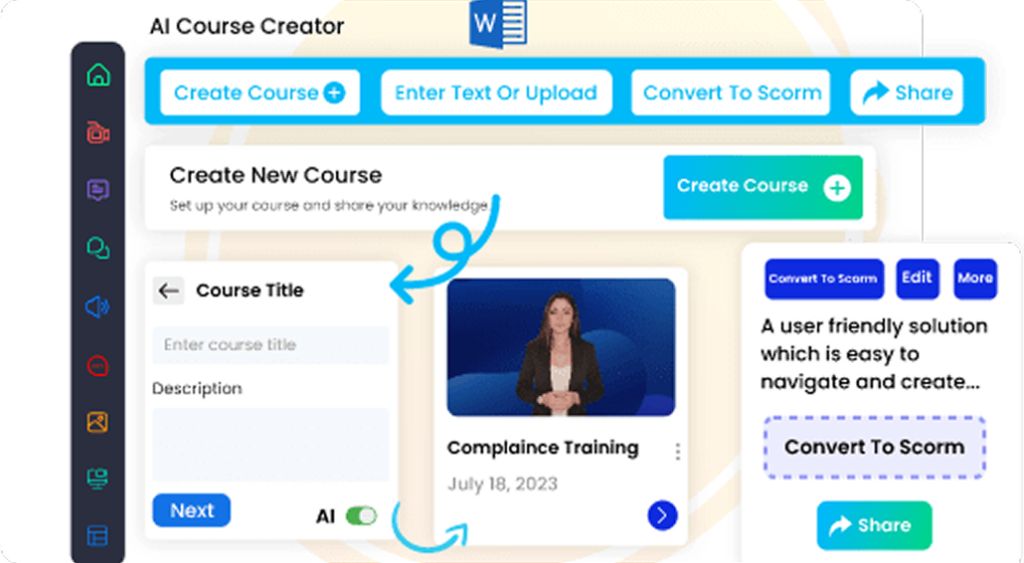Introduction
Have you ever wondered how artificial intelligence (AI) is revolutionizing education? Especially in eLearning, AI is no longer just a futuristic idea — it’s here, reshaping how courses are designed, developed, and delivered. AI in eLearning brings unprecedented opportunities for personalized, scalable, and efficient learning experiences. But how exactly is AI powering course creation? What role do AI elearning authoring tools play? And how can you leverage generative AI in elearning to create compelling, effective content?
This comprehensive guide explores the transformative impact of AI on course development, demystifies how AI for course creation works, and provides actionable insights on using authoring tool elearning powered by AI to elevate your training programs.
What Is AI in eLearning?
AI in eLearning refers to the application of artificial intelligence technologies to automate, enhance, and personalize online learning experiences. This includes the use of machine learning, natural language processing, data analytics, and generative AI models to streamline the development and delivery of educational content.
For course creators and L&D professionals, the use of AI in eLearning means faster, smarter content creation with fewer manual tasks. AI can analyze learner data to tailor course material, automate administrative tasks, generate interactive scenarios, and even craft microlearning segments dynamically.
Explore Our eLearning Course Catalog
Access 100+ of fully editable, SCORM-compatible courses featuring an integrated AI Tutor. Seamlessly compatible with any LMS, these courses are designed to elevate your training programs.
Explore Course CatalogHow Is AI Used in eLearning Course Creation?
Using AI in eLearning course creation is multifaceted. Some of the most impactful applications include:
1. Automated Content Generation and Enhancement
Thanks to generative AI in elearning, course developers can now automatically generate course scripts, quizzes, simulations, and even multimedia assets. AI algorithms analyze existing content, identify gaps, and suggest improvements, saving hundreds of hours in manual writing and editing.
2. Personalized Learning Paths
AI-powered platforms can assess learner profiles and performance to recommend customized learning paths. This adaptive learning approach improves engagement and retention by ensuring every learner receives relevant content aligned with their skill levels and goals.
3. Intelligent Authoring Tools
Modern AI eLearning authoring tools integrate AI capabilities directly into course-building software. They assist creators with content suggestions, multimedia integration, and scenario creation, simplifying complex instructional design workflows.
4. Microlearning Optimization
AI authoring tools for microlearning focus on delivering bite-sized, targeted content modules optimized for mobile and on-the-go learning. AI ensures these micro-courses meet learner needs through rapid content updates and personalized sequencing.
What Are AI eLearning Authoring Tools and How Do They Work?
AI eLearning authoring tools are specialized software platforms that incorporate AI algorithms to assist instructional designers in creating online courses. Unlike traditional authoring tools, AI-enabled platforms can:
- Automatically generate content outlines based on learning objectives
- Suggest multimedia and interactivity enhancements
- Optimize content flow for learner engagement and knowledge retention
- Provide analytics-driven insights on learner progress and content effectiveness
These tools often leverage natural language processing (NLP) and machine learning to streamline content creation workflows. By using AI, course developers can reduce repetitive tasks, improve content quality, and accelerate time-to-launch.
How Does Generative AI Transform Course Creation in eLearning?
- Automated writing of course text, explanations, and scenarios
- Creation of personalized quiz questions and feedback
- Generation of scripts for video lectures or voiceovers
- Dynamic adaptation of course content based on learner responses
By integrating generative AI, organizations can scale course creation without proportional increases in content development teams, lowering costs while enhancing learner experiences.
What Are the Benefits of Using AI for Course Creation?
- Efficiency: Automates repetitive tasks, speeding up course development cycles.
- Personalization: Tailors content to learner needs through data-driven insights.
- Quality: Improves accuracy and engagement by suggesting best practices and interactive elements.
- Scalability: Enables rapid production of multiple courses or localized content.
- Data-Driven: Provides analytics on learner behavior to continuously optimize courses.
These benefits help organizations meet evolving training demands, increase ROI, and support continuous learner development.
How to Choose the Right AI Elearning Authoring Tool?
- AI Capabilities: Does the tool offer content generation, personalization, or analytics?
- Integration: Can it seamlessly integrate with your existing LMS and content management systems?
- Ease of Use: Is the platform intuitive for instructional designers without AI expertise?
- Customization: Does it support various content types (videos, simulations, microlearning)?
- Scalability: Can it handle growing course libraries and diverse learner groups?
- Support & Updates: Are AI models regularly updated to improve functionality?
Can AI Replace Instructional Designers?
No—but it can empower them. While AI can handle repetitive tasks and offer content suggestions, human oversight is essential for ensuring educational accuracy, tone, and emotional relevance.
Best AI-Powered eLearning course creation tools
CogniSpark AI
CogniSpark AI is a cloud-based AI-powered eLearning authoring tool designed to simplify and accelerate digital course creation. Using advanced natural language processing, it helps transform raw input—like text, slides, or ideas—into structured, interactive eLearning modules. From content design to quiz generation and media recommendations, CogniSpark streamlines the development process, making it a go-to solution for L&D teams, trainers, and educators seeking an intelligent, scalable authoring solution.
Synthesia
Synthesia is a leading AI-powered video creation platform that revolutionizes eLearning content production. With realistic AI avatars, multilingual support, and intuitive text-to-video conversion, it eliminates the need for studios or voice actors. Synthesia is ideal for training teams seeking to deliver engaging, professional-quality video courses at scale and speed.
Elucidat
Elucidat combines user-friendly course authoring with smart AI tools to help large organizations scale their learning content. It offers responsive design, personalized learning paths, and content automation features supported by AI. Elucidat is ideal for L&D teams that need collaborative, brand-compliant, and scalable training solutions across global teams.
Easygenerator
Easygenerator integrates AI capabilities into its intuitive course authoring tool, enabling rapid development of high-quality eLearning content. The AI Assistant helps generate course outlines, quiz questions, and learning objectives in real-time, making it easy for subject matter experts to build and publish training without instructional design expertise.
Articulate
Articulate, known for its powerful tools like Rise 360 and Storyline 360, has begun integrating AI to support faster and smarter course creation. Rise 360 now features AI-powered text suggestions, question generation, and productivity-enhancing features that reduce manual effort while ensuring design consistency.
Explore: 24 Best eLearning Authoring Tools
What Are Some Real-World Examples of Using AI in eLearning Course Creation?
- Personalized Onboarding Programs: Companies use AI to tailor onboarding courses dynamically based on job roles and learner profiles.
- Automated Compliance Training: AI-driven authoring tools generate and update regulatory training content to stay current with laws.
- Microlearning for Sales Teams: Using AI authoring tools for microlearning to deliver quick, scenario-based sales training tailored to individual reps.
- Language Localization: Generative AI helps create localized content variants quickly, supporting global training initiatives.
These use cases highlight how organizations optimize learning outcomes with AI-powered course creation.
What Challenges Should You Consider When Using AI in eLearning?
- Data Privacy: Ensuring learner data used by AI complies with regulations like GDPR.
- Content Accuracy: AI-generated content requires human review to avoid errors.
- Technical Complexity: Teams may need training to use AI authoring tools effectively.
- Cost: Some AI platforms can be expensive upfront or require ongoing subscription fees.
- Bias: AI models must be monitored to prevent perpetuating biases in content.
By anticipating these challenges, organizations can implement AI in a responsible and effective manner.
How Can You Start Using AI for Course Creation Today?
- Assess Your Current Course Development Process: Identify manual, time-consuming tasks where AI can help.
- Pilot AI Authoring Tools: Test platforms that offer AI-powered content generation or personalization.
- Train Your Team: Equip instructional designers and SMEs with skills to work alongside AI.
- Iterate and Optimize: Use analytics from AI tools to continuously improve course effectiveness.
- Scale Gradually: Expand AI usage from pilot projects to full course libraries once proven successful.
Starting small while focusing on measurable outcomes ensures sustainable adoption.
Key Takeaways
- AI in eLearning is revolutionizing course creation by automating content generation, personalization, and optimization.
- Generative AI in elearning offers scalable solutions to rapidly produce high-quality, adaptive course materials.
- Choosing the right AI elearning authoring tools is crucial to balance automation with instructional quality.
- Responsible AI adoption requires addressing data privacy, bias, and human oversight.
- Starting with pilot projects can help organizations integrate AI smoothly and maximize ROI.
Ready to Transform Your eLearning with AI?
Discover how CogniSpark AI-powered authoring tool elearning solutions can help you harness the full potential of AI in course creation. Streamline your workflows, personalize learner experiences, and accelerate training success with cutting-edge AI elearning authoring tools built for L&D teams.
Request a Demo Today and see how AI can revolutionize your course creation process!
Table of Contents
FAQ
AI in eLearning uses artificial intelligence to enhance, automate, and personalize online learning experiences, including course creation and learner engagement.
AI-generated content should be reviewed by subject matter experts to ensure accuracy and relevance.
Most modern AI authoring tools are designed for ease of use, offering intuitive interfaces and support to help instructional designers adopt AI effectively.
AI analyzes learner data and adapts course material and pacing to individual needs, improving engagement and outcomes.



















